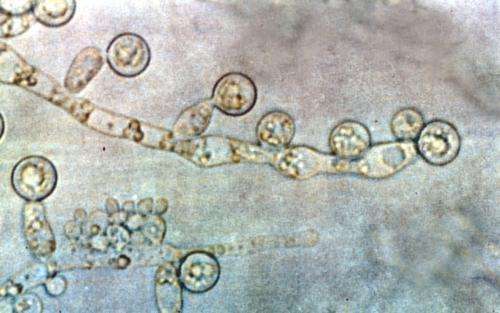This article has been reviewed according to Science X's editorial process and policies. Editors have highlighted the following attributes while ensuring the content's credibility:
fact-checked
peer-reviewed publication
trusted source
proofread
Zinc shows promise as surprising emerging treatment for vaginal yeast infections

New research could one day pave the way for the treatment of vaginal yeast infections, by shedding new light on how microbes in the body absorb zinc.
Around three-quarters of women develop vaginal yeast infections at least once in their lifetime, and approximately 140 million women globally suffer from recurrent infections. Recurrent yeast infections can have an enormous impact of quality of life. Existing anti-fungal treatments are not always effective and resistance against these treatments is developing.
Thrush is caused by a yeast called Candida. There are a number of species of Candida, but the one that causes most yeast infections is Candida albicans.
Now, new research led by the University of Exeter's MRC Center for Medical Mycology has found that the trace mineral zinc could play a surprising role. Just like us, Candida albicans needs zinc in its diet and this yeast produces a molecule (Pra1) that tries to scavenge zinc as a food source. Now, researchers have found that this molecule triggers an inflammatory response, which they believe is responsible for many cases of thrush.
The paper is entitled "Zinc prevents vaginal candidiasis by inhibiting expression of an inflammatory fungal protein," and is published in Science Translational Medicine.
Wellcome Trust Senior Fellow Dr. Duncan Wilson, of the University of Exeter's MRC Center for Medical Mycology, led the research, and said, "Recurring thrush can be deeply distressing and problematic, and we urgently need new treatments. Our new finding on zinc is very exciting, because it suggests that simple provision of zinc could block the production of the inflammatory Pra1 molecule, but we're not in the position to make treatment recommendations at this stage."
"We need larger-scale trials to confirm the effect. Please don't apply any products that are not designed for the genital area, as zinc can be toxic at high concentrations and it could be extremely unsafe."
In lab experiments, the team found that manipulating genes so that Candida albicans does not produce Pra1 prevented inflammation. They went on to find that applying relatively low levels of zinc in mice blocked Pra1 production, and prevented inflammation. This is important because it is inflammation that causes the burning, itching symptoms of thrush.
The research team also recruited women who had been experiencing vaginal infections at least once every three months. The women applied a vaginal moisturizing cream which contains a small amount of zinc nightly for two weeks, and then twice a week. Of six women who completed the study and had vulvovaginal candidiasis (thrush), five of them did not experience reinfection over the three-month study.
Dr. Wilson said, "These findings are very encouraging, although the number of participants is small. We are now carrying out a larger clinical trial to confirm that zinc treatments are effective. In the longer term, we hope this could be a promising strategy for a condition could evolve resistance to treatment."
"We'd been studying this Pra1 molecule for more than ten years to understand its role in zinc scavenging—this research shows the fundamental importance of basic research of this nature, which can help shed light on how our bodies work and sometimes provide surprising routes to new treatments."
More information: Elena Roselletti et al, Zinc prevents vaginal candidiasis by inhibiting expression of an inflammatory fungal protein, Science Translational Medicine (2023). DOI: 10.1126/scitranslmed.adi3363. www.science.org/doi/10.1126/scitranslmed.adi3363




















